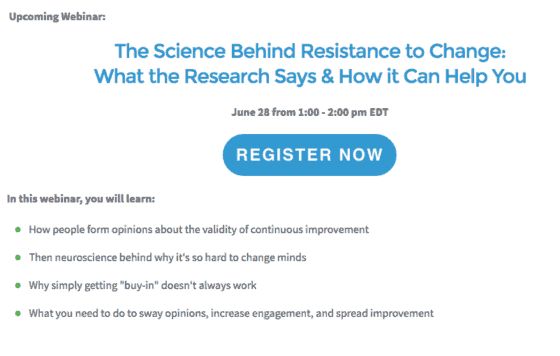I've known Dr. Mark Jaben for a while now… we share not just a similar sounding name, but also a passion for healthcare improvement. You can hear my 2014 podcast with him about change and brain science.
He's recently written two really interesting guest posts on our KaiNexus blog:
He writes about the amygdala or our “reptile brain.”
“…if you're talking to someone about a closely-held belief, they're thinking with their amygdala. And if they're thinking with their amygdala, they're not open to other possibilities. Therefore, you are unlikely to have a productive discussion about any change with someone processing that information in their amygdala.”
Prof. Bob Maurer, in his book The Spirit of Kaizen, writes about the amygdala and the “fight or flight” response that kicks in when we're presented with the idea of change (hear my podcast with Dr. Maurer). We can't tell people, “Don't be afraid of change.” We have to recognize this reality and make change small and engage people through Kaizen. That makes change less scary.
Dr. Jaben brings up some other brain science here about why it's hard to get people to change deeply held beliefs. I've found it's easier to say “what Lean is” than it is to get executives with decades of experience to suddenly think differently. Many leaders think that errors are caused primarily by bad individuals. When they blame people, their amygdala probably lights up in a functional MRI. It's hard for them to think differently and start looking at systems and processes as the cause of errors (as Prof. Steve Spear recently wrote about).
What can we do to help people change their thinking? Read more in Jaben's post.
Many of us complain about our inability to get executives to listen to us about Lean. Dr. Jaben says there's nothing wrong with the message… the problem is the messenger:
“… if you can't get senior leader participation, staff ‘buy in,' or traction for continuous improvement, and if your tactic is to get their ‘buy-in' with data, facts, experience or memory, you are likely struggling because you're failing to address the root cause of the problem: your credibility.”
How can we, as individuals, build our personal credibility? Do we need to rely more on existing CEOs (who would probably have more credibility) like Dr. John Toussaint or Dr. Gary Kaplan?
That might work, but there aren't many of them to go around. Kaplan is busy running a health system (although he spends some time speaking and teaching) and Toussaint is super busy around the world.
One problem is many CEOs will find reasons to say why Toussaint or Kaplan don't have credibility to them: They weren't trained at Harvard, they don't run academic medical centers, their systems are too small, etc.
Read more of Jaben's post to see what he says we can do about this credibility gap.
Upcoming Webinar on 6/28:
I'm hosting a KaiNexus webinar with Dr. Jaben for him to present more about these topics. It's being held on June 28th and you can attend live or view a recording.
I think this will be a great webinar. He'll challenge some of what Dr. Greg Jacobson and I have previously presented on “getting buy in.” I'll learn a lot from this session and I hope you will too. Register today.
What do you think? Please scroll down (or click) to post a comment. Or please share the post with your thoughts on LinkedIn – and follow me or connect with me there.
Did you like this post? Make sure you don't miss a post or podcast — Subscribe to get notified about posts via email daily or weekly.
Check out my latest book, The Mistakes That Make Us: Cultivating a Culture of Learning and Innovation:










